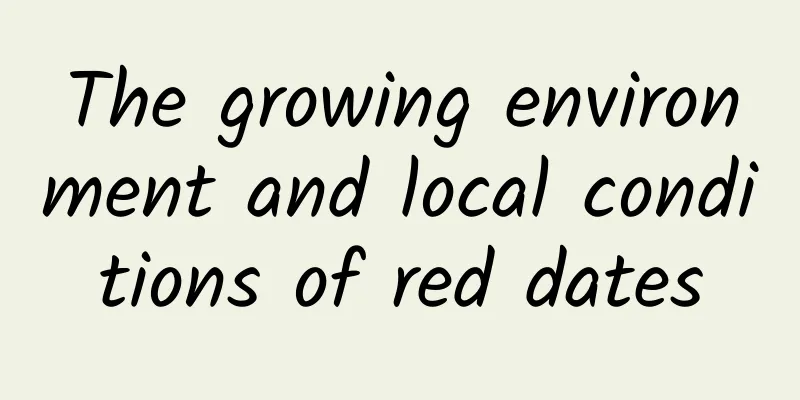The growing environment and local conditions of red dates

The growth environment and conditions of red datesRed dates are generally distributed in areas below 1,700 meters above sea level and are often planted in mountainous areas, hills or plains. They are native to China and are also commonly cultivated in Asia, Europe and America. Jujube growth conditionsJujube has a certain degree of drought and waterlogging resistance, but a higher air humidity is needed during the flowering period, otherwise it is not conducive to pollination and fruiting. In addition, it is a light-loving plant and is suitable for growing in places with good light. It has no strict requirements on soil and is resistant to barrenness and salinity, but is afraid of wind, so care should be taken to avoid windy areas during the garden construction process. Jujube growth temperatureRed dates like a warm environment with an average annual temperature of about 15 degrees. The suitable temperature for germination is 13-15 degrees, the temperature for branching and leafing is 17 degrees, the temperature for flowering and fruiting is 22-25 degrees, and the temperature for fruit ripening should be 18-22 degrees. The growth process of red datesThe buds of red dates are green and begin to appear in April and May every year. After pollination, the ovary begins to swell and the disk gradually shrinks. Then the fruit gradually swells. Underdeveloped fruits or those that set fruit late usually wilt, leaving only 1-2 fruits in each inflorescence. The fruit turns red in August and September, indicating that it is ripe and can be eaten fresh at this time. Date planting time and methodRed dates can be planted in spring and autumn. In areas where there is no severe cold in winter and the average temperature in January is above minus 8 degrees Celsius, they can be planted in autumn, that is, after the red dates fall their leaves and before the soil freezes. In the warm areas in the south, some new roots can grow in the same year and can grow in time in the spring of the following year. Before planting red dates, you should choose a sandy loam plot with flat terrain, convenient drainage and fertile soil, select seedlings that are free of pests and diseases such as madness and scale insects, and keep the soil moist after planting. Keep them in a sunny and ventilated place, and they will sprout soon. |
<<: Phalaenopsis's growing environment and local conditions
>>: The growing environment and local conditions of the plant
Recommend
In which month do we start growing sweet potato seedlings?
Sweet potatoes are a common crop and are grown in...
Diseases and Pests of Citron and Their Control
Diseases of Buddha's Hand Sooty Disease of Bu...
When will the golden marbles bloom and bear fruit?
When does the golden marble bloom? The golden bal...
The pros and cons of nostalgic and elegant roses
The Nostalgic Elegant rose has the style characte...
Do sunflowers need watering every day?
Do you water your sunflowers every day? Sunflower...
Does Daphne odora prefer shade or sun?
Does Daphne odora prefer shade or sun? Osmanthus ...
When do azaleas bloom?
When do azaleas bloom? Different azalea varieties...
Is the Lotus Lantern suitable for a large or small pot?
Is it better to use a large or small pot for the ...
How to sow desert rose
1. Sowing time Desert rose is a drought-resistant...
How to fertilize the iron tree? What fertilizer is best?
Dracaena, also known as Cycas, is an evergreen pl...
Key points for aquaculture management in May
As the temperature gradually rises, summer has qu...
The difference between Caragana and Goldfinch
1. Caragana Caragana, also known as goldbroom and...
Lotus seed planting method and time
Lotus seed planting time Lotus seeds have no dorm...
How to care for straw chrysanthemum
Straw daisy growing conditions Straw daisy prefer...
When are ginkgo nuts ripe for picking?
Ginkgo nuts , also known as gingko nuts , are the...









